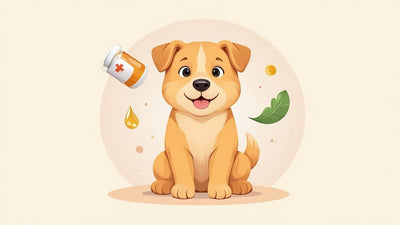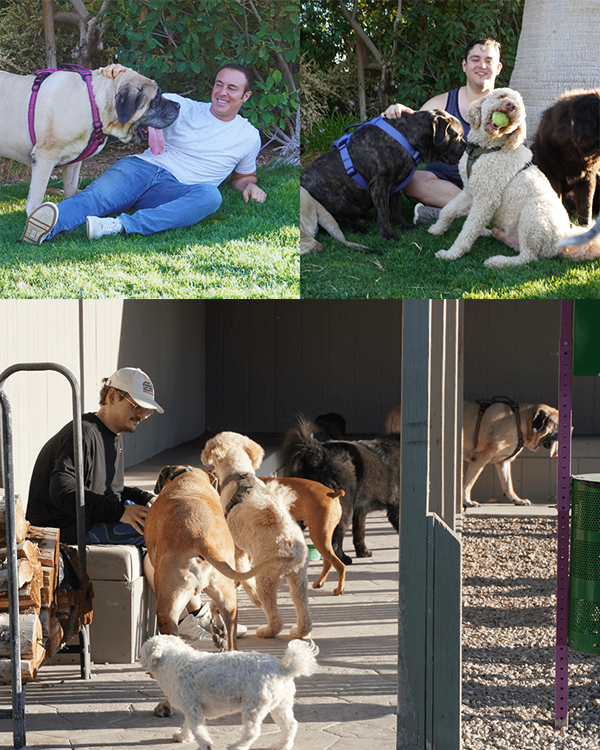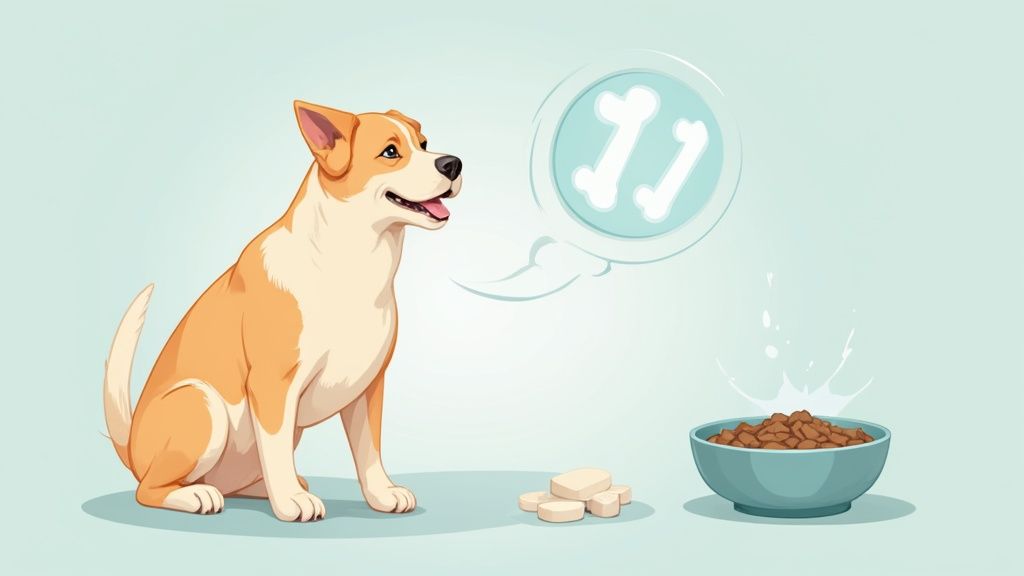
Calcium Deficiency in Dogs: Symptoms and Support
When you notice something just isn't quite right with your dog, it can be a lonely feeling. Maybe it's a new restlessness at night or a faint tremor in their leg you can't unsee. That quiet worry is something we understand deeply. These small changes can be the first whispers of a condition called hypocalcemia, or low blood calcium. Learning to recognize these subtle clues is the first step on the journey to getting them the support they need.
Recognizing The Early Signs Of Calcium Deficiency
That nagging feeling you get when you notice something is just a little off with your dog? Trust that feeling. You're seeing subtle shifts that matter—a faint muscle tremor after a walk, that pacing in the hallway at night, or a new disinterest in their dinner. You're not alone in noticing these things, and they can be significant.
These moments can be the earliest whispers of a calcium deficiency. Calcium does more than just build strong bones; it’s a vital messenger for nerve signals and muscle contractions. When levels are low, the communication lines get a bit fuzzy. That's why the first signs are almost always related to their muscles or nerves.
The Quiet Language Of Early Symptoms
The initial signs are rarely dramatic. They are small moments that might make you pause and wonder. Recognizing them is about connecting these quiet observations and understanding what they might mean.
Here’s what you might notice in the very early stages:
- Muscle Tremors or Twitching: You might see a slight, involuntary quiver in your dog’s leg while they’re resting or a tiny twitch around their face. It's often so brief you might think you imagined it.
- Restlessness or Pacing: Your dog may seem unable to settle down, pacing the room or getting up and down frequently for no apparent reason. This can be especially noticeable at night when the house is quiet.
- Facial Rubbing: Some dogs will start compulsively rubbing their face against the carpet or pawing at their muzzle. This is often their reaction to a strange tingling sensation, similar to when our foot falls asleep.
This infographic helps visualize one of the most common yet subtle early signs—a faint muscle tremor.
As you can see, it's not a dramatic event. It’s a gentle, almost unnoticeable quiver that points to a slight misfire in the body’s intricate communication system.
To help you keep track, here is a quick reference guide to these early indicators.
Early Warning Signs of Low Calcium
This table breaks down some of the potential signs of calcium deficiency you might observe in your dog's daily behavior.
| Symptom Category | What You Might Notice |
|---|---|
| Muscular | Faint muscle tremors, twitching (especially in the face or legs), muscle cramps or stiffness after exercise. |
| Behavioral | Increased restlessness, pacing, inability to settle, panting without being hot or tired. |
| Neurological | Pawing or rubbing at the face, disorientation, unusual sensitivity to touch or sound. |
| Appetite | A sudden loss of interest in food, picky eating that is out of character. |
Catching these signs early and having a conversation with your vet can make a world of difference in managing the issue before it progresses.
When Subtle Signs Become More Obvious
If the imbalance isn't addressed, these quiet signs can become louder. The journey is different for every dog, but you might start to see more pronounced changes in their behavior and physical well-being.
It's so important to understand that these early behaviors aren't your dog being "difficult" or "anxious" for no reason. They are often their body's way of communicating an internal imbalance that needs attention.
As calcium levels drop further, the condition can lead to more significant issues like muscle weakness, difficulty walking, or even seizures. It's a serious concern that can be triggered by a number of things, from nutritional imbalances to underlying health problems.
It's also worth remembering that some of these neurological signs can overlap with other conditions. For a broader perspective on how to differentiate them, you might find our guide on the signs of neurological problems in puppies helpful, as it provides a wider context.
Our goal here isn't to cause alarm but to empower you with knowledge. By learning to recognize these early signs, you become your dog's best and most effective advocate, ready to get them the right support for many more good days together.
Get Your FREE Dog Brain Health Guide

Get instant FREE access to today's top ways to help your best friend live a longer, healthier, happier life.
- 39 value-packed pages of expert insights
- Early-detection tips for cognitive decline
- Top brain-boosting superfoods
- Vet-approved mental sharpness strategies
- Fun IQ tests for your dog
How Calcium Supports Your Dog's Everyday Wellness
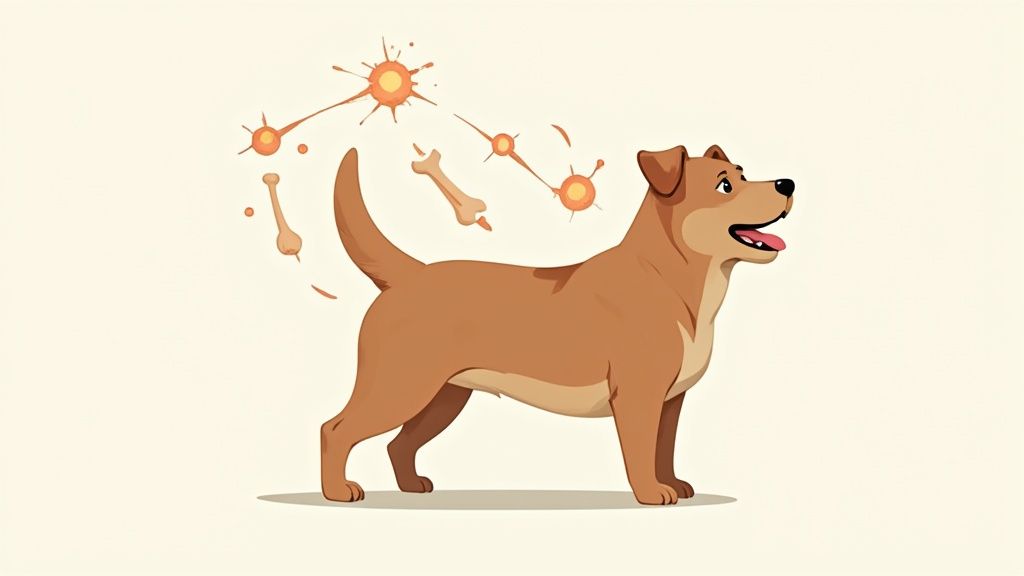
When we think of calcium, our minds almost automatically jump to bones and teeth. And for good reason—it’s the main mineral that builds a strong skeleton. But its job in your dog's daily health is far more dynamic than just sitting passively in their bones.
Think of calcium as the body's chief messenger, the spark that ignites countless biological processes. It's the tireless worker behind the scenes making sure everything from a wagging tail to a steady heartbeat functions just right. It’s the hidden ingredient in all those moments of joy and connection we share with them.
The Spark Behind Every Movement
Every single time your dog pounces on a toy, nudges you for a pet, or even just blinks, that's calcium in action. It functions like an on/off switch for every muscle cell in their body.
Picture a muscle fiber as a spring, ready to be sprung. To make that spring contract and create movement, it needs a very specific signal. Calcium ions are that signal. They rush into the muscle cells, triggering them to tighten and get to work. When calcium levels are low, that signal gets weak and fuzzy, which can lead to muscle tremors or even stiffness.
This isn't a once-in-a-while thing; it's a constant, incredibly precise process. It’s the quiet science powering every playful leap and every comforting lean on your leg.
The Traffic Controller for Nerve Impulses
Beyond just muscles, calcium is a huge player in your dog's nervous system. It’s essentially the traffic controller for every message zipping from the brain to the rest of the body.
Imagine a nerve impulse as a message being passed down a line of people. For the message to get from one person to the next, someone has to give the "go" signal. Calcium is that signal, allowing the message to jump the gap (called a synapse) between nerve cells and continue on its way.
A stable calcium balance ensures the body's entire communication network runs without a hitch. If that balance is off, messages can get garbled or delayed, sometimes showing up as subtle behavioral changes or a dulled reflex.
This is why the right calcium level is so crucial for their overall comfort and well-being. It helps maintain those internal communication lines crystal clear.
Maintaining the Rhythm of Life
One of calcium’s most critical—and invisible—roles is helping maintain a steady, strong heartbeat. The heart is a muscle, after all, and just like the muscles in the legs, it relies on calcium to contract and pump blood.
The mineral is key to maintaining a regular cardiac rhythm, which supports a consistent flow of oxygen and nutrients to every single organ and tissue. It's a silent but powerful force that directly contributes to your dog's energy levels and stamina.
So, let's break it down. Calcium has three core jobs it performs every second of the day:
- Muscle Contraction: It provides the "go" signal for muscles to move, powering everything from a sprint across the park to the simple act of breathing.
- Nerve Transmission: It allows nerve cells to talk to each other, supporting reflexes, sensation, and coordination.
- Heart Function: It helps maintain the heart’s rhythm, making sure blood is pumped efficiently to support all other bodily functions.
When you see how interconnected these roles are, it becomes clear why even a small imbalance can have such a big ripple effect. A calcium deficiency isn't just a bone problem; it’s an issue with the very electrical system that runs your dog's body. Understanding this makes it clear just how vital this mineral is for their everyday happiness.
What's Behind Low Calcium in Dogs?
It's one of the first questions we ask ourselves when our dog might be unwell: "How did this happen?" That question comes from a place of deep concern, and finding the answer is the first step toward helping them feel better.
When it comes to low calcium, or hypocalcemia, it’s rarely a standalone issue. Think of it more as a symptom—a red flag that some other process in your dog's body has gone awry. To figure out what's going on, we usually look at three main areas: what they're eating, what their body is going through, and whether there's an underlying health problem.
It Often Starts with the Food Bowl
Most commercial dog foods you buy at the store are carefully formulated to be "complete and balanced," but dietary gaps can still happen. This is especially true for pet parents who put incredible love and effort into preparing homemade or raw diets.
For instance, meat is packed with phosphorus but has very little calcium. A dog's body needs a specific calcium-to-phosphorus ratio to function correctly. If a diet is mostly meat without a proper calcium source (like bone meal or a specific supplement), that delicate balance gets thrown off, and problems can develop over time.
If you're feeding a homemade diet, you're already going above and beyond. Navigating canine nutrition is complex, and an imbalance isn't a failure—it's just a sign that a little course correction is needed to support their health even more.
This is exactly why consulting with a veterinarian or a board-certified veterinary nutritionist is so important when you're crafting a diet from scratch. They can help you get those crucial mineral levels dialed in perfectly for your dog.
When Life Demands More Calcium
Some life stages are incredibly demanding on a dog's body, causing their calcium needs to skyrocket. If their diet doesn't keep up, a deficiency is a very real risk.
Two of the most intense periods are:
- Pregnancy and Nursing: A mama dog is a calcium-giving machine. She transfers enormous amounts to her puppies, first through the placenta and then through her milk. This can drain her own reserves so quickly that her body can't keep up, leading to a dangerous situation called eclampsia (or milk fever).
- Growing Puppies: Pups, especially large-breed ones, are building an entire skeleton in a matter of months. They need a precise amount of calcium for strong, healthy bones. Too little is a problem, but it's just as important to know that too much can also cause serious developmental bone issues.
During these times, their bodies are working in overdrive, and their nutritional needs have to match that extraordinary effort.
Underlying Health Issues
Sometimes, the diet is perfect, but the dog's body simply can't regulate or absorb the calcium it's getting. Several health conditions can disrupt this complex internal system.
Kidney disease, for example, can interfere with the body's ability to activate vitamin D. Vitamin D acts like a key, unlocking the door that allows calcium to pass from the intestines into the bloodstream. Without enough of that key, it doesn't matter how much calcium is in their food; the body just can't use it.
Other potential medical causes include:
- Hypoparathyroidism: A rare condition where the parathyroid glands fail to produce enough parathyroid hormone (PTH). PTH is like the body's calcium thermostat; without it, blood calcium levels drop.
- Malabsorption Issues: Conditions affecting the small intestine, such as inflammatory bowel disease (IBD), can prevent the absorption of all sorts of nutrients, including calcium.
Uncovering these root causes is a partnership between you and your vet. Knowing these possibilities arms you with the right questions and observations, helping you work together to get the answers your dog needs to get back on their paws.
What to Expect During a Veterinary Diagnosis
Figuring out what's happening with your dog can be a nerve-wracking experience, but understanding the process can make all the difference. When you and your veterinarian team up, you can move from a place of worry to one of clarity and action.
Your observations from home are the first crucial piece of the puzzle. When you walk into the clinic, be ready to share everything you’ve noticed—the subtle tremors, the new restlessness, or even a change in their nursing habits. No detail is too small.
The Initial Physical Examination
The first thing your vet will do is a complete physical exam. This is more than just a quick once-over. They're on the hunt for specific clues that might point to a calcium deficiency in dogs.
During this hands-on check, your vet will likely:
- Test Reflexes: They’ll check your dog’s neurological responses. An exaggerated or delayed reflex can signal an issue with nerve communication, a common side effect of low calcium.
- Assess Muscle Tone: The vet will feel your dog’s muscles for twitching, stiffness, or weakness that you might not have even spotted at home.
- Listen to the Heart: A steady heartbeat is a good sign. They'll listen closely for any unusual rhythms, as calcium plays a key role in heart muscle function.
This exam gives your vet a solid foundation and helps them decide what to do next. It's a true partnership between your at-home observations and their clinical expertise.
The Power of a Simple Blood Test
If the physical exam raises a red flag, a blood test is almost always the next step. This is how you get definitive answers. The gold standard here is a serum chemistry panel.
That might sound complicated, but it's just a routine blood test that gives a snapshot of your dog's internal health. It measures the levels of different substances in the blood, including crucial minerals like calcium.
This single test can confirm or rule out hypocalcemia. It takes you out of the land of worried guessing and into the realm of concrete facts.
The results are powerful. They don’t just tell your vet if calcium is low; they reveal how low it is. This is critical information for planning the right support.
Looking Deeper for the Root Cause
Finding out your dog has low calcium is a big step, but it’s not the end of the story. The real question is: why did it happen in the first place?
To get to the bottom of it, your vet might recommend more tests. This could mean taking a closer look at kidney function, checking hormone levels (especially the parathyroid hormone), or doing a deep dive into their diet.
Uncovering the root cause is the key to creating a long-term wellness plan that truly supports your dog. By knowing what to expect at the vet, you can feel more in control and less anxious, ready to be the best possible advocate for your dog's health.

Support Your Dog's Brain Health with NeuroChew™
As mentioned in this article, NeuroChew is the first dog chew designed to support both cognitive function and healthy circulation. Perfect for dogs showing early signs of cognitive decline or for proactive brain health support.
Supporting Your Dog with Balanced Nutrition
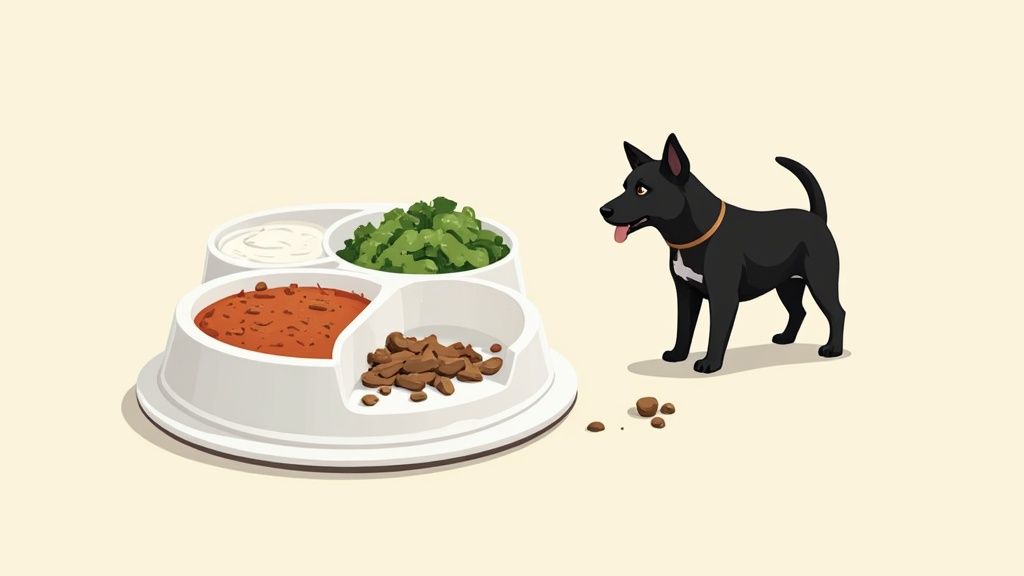
Hearing a diagnosis for your dog can be unsettling, but it’s also the moment we can shift from worry to action. And the best place to start is right at their food bowl.
Every single meal is a chance to support your dog's health from the inside out. The right nutrition is the foundation for everything they do, from that happy tail wag when you walk in the door to a comfortable afternoon nap. Even small, thoughtful changes to their diet can make a huge difference, giving you more good days with your best friend.
The Power of a Complete and Balanced Diet
Most high-quality commercial dog foods are labeled "complete and balanced" for a reason. These formulas are the result of extensive nutritional research, designed to provide every nutrient a dog needs—including calcium—in just the right amounts for their age and size.
But what if your vet has confirmed a calcium deficiency? This doesn't mean you need to throw out everything and start over. Instead, your vet will likely suggest targeted adjustments to help gently nudge those mineral levels back into balance. The goal is to correct the problem without creating new ones.
We know you want to do everything in your power to help your dog. The single most effective thing you can do is work with your vet to ensure their diet is properly balanced for their specific needs. It's the bedrock of their long-term health.
This partnership between you and your vet is critical. It ensures every change you make is safe, effective, and truly right for your dog.
A Realistic Look at Nutritional Supplements
In some cases, especially when an underlying health issue is at play, diet alone might not be enough to get calcium levels where they need to be. This is where supplements can step in as a valuable tool. Think of them not as a magic bullet, but as a helping hand to support the body’s natural balance.
It's all about approaching supplements with a mix of hope and realism. They're one piece of a bigger wellness puzzle, working alongside a great diet and your vet's expert care.
The supplement market for dogs is growing, which just goes to show how much we all care about our pets' health. We're seeing more and more convenient oral options like powders and chewable tablets, reflecting a growing understanding of how vital nutrients like calcium are. According to Data Insights Market Research, the global market for these supplements is on the rise as owners become more proactive.
When choosing a supplement, a little homework goes a long way.
- Talk to Your Vet First: This is non-negotiable. Your veterinarian can recommend the right type and dose based on your dog’s bloodwork and overall health profile.
- Check the Ingredients: Look for high-quality, bioavailable forms of calcium. This means your dog’s body can actually absorb and use the nutrient effectively.
- Look for Third-Party Testing: The best brands voluntarily send their products to independent labs to verify their purity and potency. This gives you confidence in what you're buying.
If you're looking to dive deeper into this, our comprehensive guide to dog nutrition and supplements can shed more light on the subject. Just remember, this is a journey. Every small, informed decision you make is a victory for your dog.
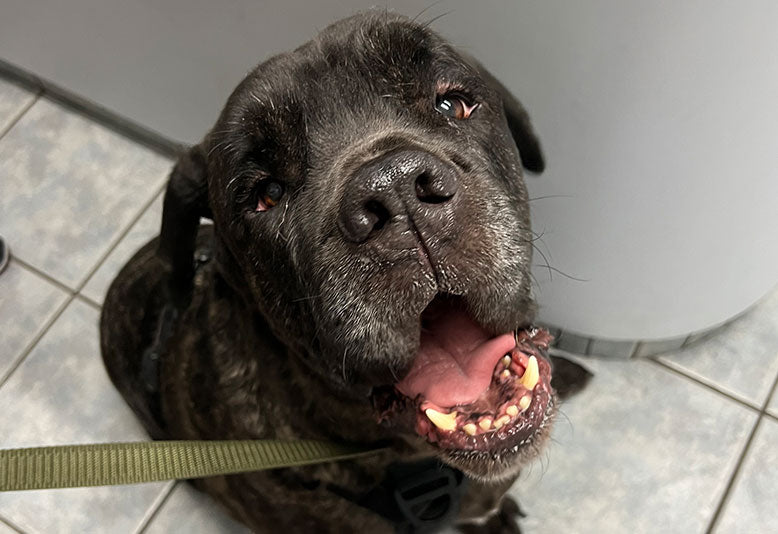
Real Results: How NeuroChew Helped Brutus Regain His Mental Clarity
Brutus was getting disoriented at night. After starting NeuroChew, he's more happy during the day and steady at night. He's back to his old self!
Preventing Problems Before They Start: A Long-Term Health Strategy
Maintaining your dog's health is all about the little things you do every day. It's not about grand gestures, but a steady commitment to their well-being. Think of it as a partnership between you, your dog, and your vet, all working together to build a foundation for a long, happy life.
You're the one on the front lines. You see the subtle changes in their energy, their appetite, or their comfort levels. Those observations are invaluable.
Your Vet: Your Partner in Proactive Care
Regular vet check-ups are essential for long-term health. These visits aren't just for shots; they establish a baseline of what’s normal for your dog. This history is crucial.
When your vet knows your dog well, they can spot tiny changes over time that might signal a brewing problem. This is how you get ahead of issues. Instead of reacting to a full-blown calcium deficiency in dogs, you're discussing minor adjustments during a routine exam. It’s the difference between managing a crisis and preventing one.
Nutrition is the Foundation
A balanced diet, specifically chosen for your dog's age, breed, and activity level, is the other half of the equation. A growing puppy’s needs are a world away from a senior dog’s. A high-energy herding dog requires a different kind of fuel than a couch-loving companion.
Getting the details right matters. According to the National Research Council (NRC), an adult dog weighing about 44 pounds needs around 1,229 mg of calcium each day just for maintenance. You can dig into the science behind these numbers on the NCBI website, which highlights just how precise canine nutrition can be.
Every bowl of food is a chance to build good health. When you tailor their diet to their specific needs, you're giving their body the exact tools it needs to function at its best.
Of course, it’s not just about calcium. A whole symphony of nutrients has to work together. B vitamins, for instance, play a huge role in overall vitality. To see how one small piece fits into the larger puzzle, check out our guide on the importance of folic acid for dogs.
Ultimately, prevention is just a continuation of the love and care you already give your dog. By teaming up with your vet and making smart nutritional choices, you’re giving them the best gift possible: many more happy, healthy years with you.
Answering Your Questions About Calcium for Dogs
When you're worried about your dog's health, it's natural to have a lot of questions. It's a sign you're a caring and attentive owner. Let's walk through some of the most common things people ask when it comes to calcium.
Can I Just Give My Dog My Own Calcium Supplements?
It's a thoughtful question, but the answer is a firm no. Human supplements can be problematic for dogs, and here's why: it all comes down to the delicate calcium-to-phosphorus ratio that their bodies are designed to maintain.
Our supplements are formulated for human physiology, not canine. Giving them to your dog can easily throw this crucial balance out of whack, leading to a calcium overload and a whole new set of health problems. The safest journey is to always talk to your vet first; they can point you to a product made specifically for a dog's unique needs.
What's the Right Amount of Daily Calcium for My Dog?
There’s no magic number here, because the "right" amount is a moving target. It depends entirely on your dog's age, size, breed, and what stage of life they're in. A rapidly growing Great Dane puppy, for instance, has vastly different calcium needs than a senior Chihuahua.
The good news is that most commercial dog foods that are labeled "complete and balanced" have already done the math for the average adult dog. If you have a specific concern about a calcium deficiency in dogs, the only way to know for certain is with a blood test from your veterinarian. That's how you'll get a clear picture and a plan that's right for your pup.
Every dog is an individual. Instead of searching for a one-size-fits-all dose, the real goal is achieving the perfect mineral balance for your dog, and your vet is the best person to help you figure that out.
Are There Any Natural Foods I Can Add for a Calcium Boost?
Absolutely. Certain whole foods can provide a nice, natural source of calcium. A spoonful of plain yogurt or kefir can be a great addition, and some leafy greens or legumes are also good sources.
The key word, however, is addition. It's incredibly tricky to correct a genuine deficiency with food alone, and you could accidentally disrupt the overall nutritional balance of their diet. Think of these foods as healthy toppers, not a treatment. Your primary focus should always be their main, well-formulated diet and professional guidance from your vet.
At Furever Active, we're passionate about helping your dog thrive through every age and stage. Discover more about our approach to complete brain and body wellness at https://fureveractive.com.
Share This Article

Support Your Dog's Brain Health with NeuroChew™
The first dog chew that supports both brain function and healthy circulation. Perfect for dogs of all ages.
- Enhances cognitive function & mental clarity
- Reduces anxiety without sedation
- Supports healthy blood circulation
- Made in USA with natural ingredients
60-Day Money-Back Guarantee • Free Shipping



